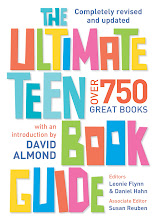What a week! I've been reading Hero by Perry Moore, and though I've loved it, I've also been deeply frustrated by its shallowness. Yes, I know it's a comic book in text, but I'd like more than just moving from set-piece to set-piece with the emotions running blatantly across the top. I keep wondering how someone like, say, Paul Magrs would have dealt with the idea... Not that I'm not enjoying Hero, not at all. It could just have been more. The author is really someone more at home with the movie world than the teen / YA book one, so it's not surprising that the book reads like a film - and one is apparently in the early stages of production. Which in turn makes me wonder which young actor will be brave enough to play Thom! Anyway, Hero is different, interesting and fairly racy - definitely not for younger readers, but great for older teens interested in either heroic stereotypes or gay protagonists.
Perry Moore's website is fascinating - perrymoorestories.com - and he says that he had the idea for Hero after making a list of all the gay superheroes who had met appalling fates in their Marvel / DC / etc. worlds (WHO CARES ABOUT THE DEATH OF A GAY SUPERHERO ANYWAY?: A HISTORY OF GAYS IN COMIC BOOKS). His site has a list - one that I found quite eye-opening. I mean, did I expect the comic world to be more liberal? Yes! I suspect that my exposure to less mainstream comics and manga had made me sanguine about the genre's openness. Oh well. Wrong again.
:::
The other teen book part of my week was attending the launch of Just Henry - Michelle Magorian was there in person, and she read from the book, wonderfully. She was pretty wonderful herself, and I had a lovely evening. I took a 13 year old fan with me, and MM was delightful to him. He came along as he'd read my proof copy of the book, pouncing on it as soon he saw it was about movies, which are his passion. He loved the book too, so was able to enthuse muchly to MM, which I hope pleased her. A thoroughly good evening all round.
12 years ago
.jpg)

